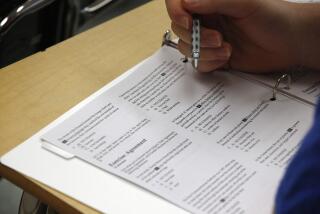Judging what GRE doesn’t: personality
- Share via
Because nearly half of all students who start doctoral programs don’t finish, educators have long wondered how best to judge applicants to graduate schools and reduce that attrition rate.
Is there a way to evaluate a student’s drive, persistence, honesty and creativity? What is needed beyond college grades, test scores and traditional recommendation letters?
The Educational Testing Service says it has just the thing. The ETS, which runs the Graduate Record Examinations, will soon offer a supplemental assessment of graduate school applicants on those personal characteristics that could help students tackle advanced studies.
The new online system, called the Personal Potential Index, will ask faculty who know the students to rank them on a 1-5 scale for such attributes as communication skills, teamwork, resilience, organization and integrity. It asks 24 questions, including whether the candidate “produces novel ideas,” “meets deadlines,” “works well under stress” and “is worthy of trust from others.”
--
Incomplete picture
The main GRE, a widely used four-hour exam of multiple choice questions and essays, tests academic skills and is a valuable admissions tool, but it is not enough, said Patrick Kyllonen, an ETS research official who helped develop the new personality rating tool.
“Every faculty member can tell you about students with very high GRE scores who never finish their degree and some who get barely admitted based on their scores and go on to become academic stars,” he said from ETS headquarters in Princeton, N.J. “What are the personal attributes that help someone get over serious barriers and succeed? We are hoping this will go a long way to capture some of those qualities.”
The new program, to be offered to GRE test takers for the first time next month, allows applicants to submit names and e-mails of professors who could evaluate them. Then ETS will ask the faculty members to fill out the online evaluations and add written comments.
Officials with ETS, a nonprofit organization, say the index is not intended to replace recommendation letters or other evaluations universities require, but it will provide a much-needed standardization.
Reaction in academia has been mixed, with some educators suspicious of ETS’ motives.
Debra Stewart, president of the Washington-based Council of Graduate Schools, said that she was not endorsing the new system but that universities had long sought a way to improve matches between students and graduate schools and cut attrition. “The match is often a matter not only of academic credentials and quantitative scores, but also noncognitive measures,” she said. “A measure of that would be very helpful.”
Last year, her organization issued a report showing that only about 57% of graduate students finish their doctorates within 10 years, a point past which completion is rare.
--
In doubt
L. Katharine Harrington, USC’s dean of admissions and financial aid, was more skeptical of the new assessment tool. Harrington emphasized that she had not been briefed by ETS about it, but said it “sounds like a way for ETS to make money.” She said the best evaluations were individualized letters from faculty, and she questioned whether a standardized form would have value.
ETS officials said that the new assessment tool, which took a decade to create, would generate some extra revenue but that money was not the motivation. More than 600,000 people a year take the GRE -- the current fee for the general test is $150. At no extra charge, their personality ratings can be sent to up to four graduate schools, with each additional school costing $20. Students can also use the personality assessment without taking the GRE and pay $20 a report.
David Payne, ETS’ vice president for college and graduate programs, said he did not know how many schools might require the new ratings in the next admissions cycle. He estimated that it would become widespread after a year or two and said he expected it to become popular among undergraduates and possibly affect their behaviors.
“If they know they are being judged by things like teamwork, they may become better team players,” he said.
--
More to Read
Sign up for Essential California
The most important California stories and recommendations in your inbox every morning.
You may occasionally receive promotional content from the Los Angeles Times.










